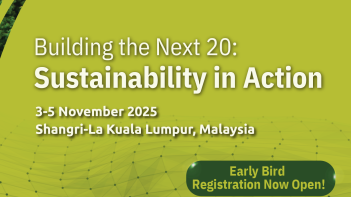Palm Oil Actors Call for Promotion of RSPO Certification, Aiming to Drive Regional and Global Demand for Sustainable Thai Palm Oil Products
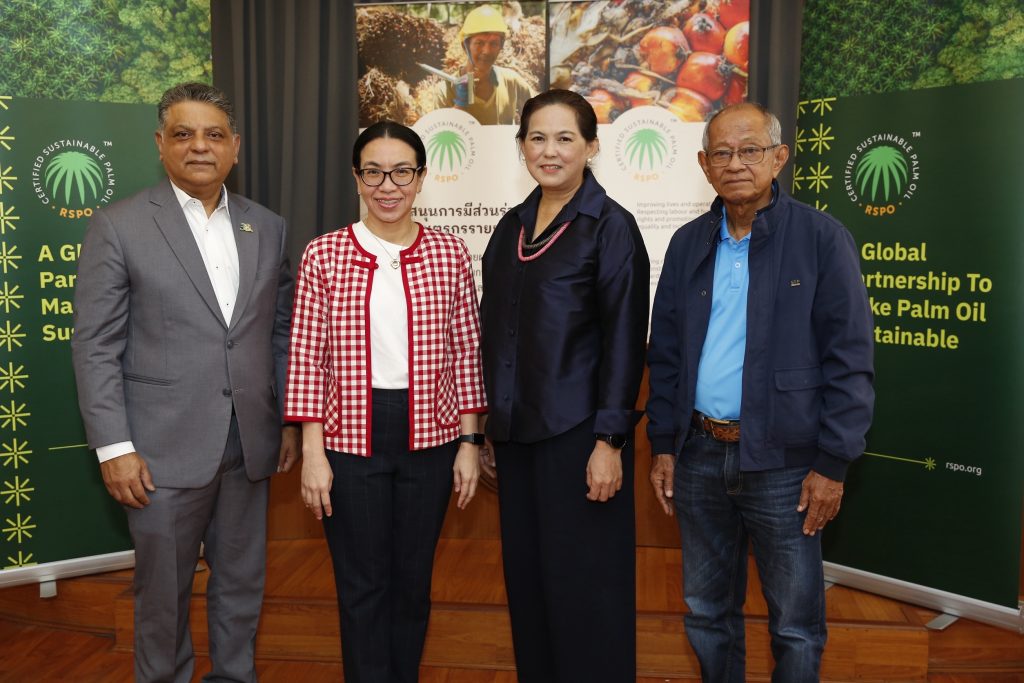
Bangkok, 25 October 2024: Thailand, the world’s third-largest exporter of palm oil, is strengthening public-private partnerships to create a more sustainable palm oil industry. On Friday, October 25, 2024, the Roundtable on Sustainable Palm Oil (RSPO) held a media and stakeholder briefing to provide insights into Thailand’s sustainable palm oil sector. Participants included representatives from the Thailand Alliance for Sustainable Palm Oil (TASPO), the Office of Agricultural Economics, the Ministry of Agriculture and Cooperatives and the Srijaroen Sustainable Oil Palm Production Community Enterprise Group.
Thailand’s sustainable palm oil production has demonstrated extraordinary growth of more than 200%, expanding from 348,027 tonnes in 2019 to 1,112,048 tonnes in 2024. This surge is centred in key southern provinces, including Surat Thani, Krabi, Chumphon, Nakhon Si Thammarat, and Phangnga. Thailand’s certified sustainable palm oil (CSPO) spans an impressive 57,336 hectares, a reflection of the country’s prioritisation of sustainable agricultural practices.
Asanee Malampush, President of the Thailand Alliance for Sustainable Palm Oil (TASPO) and President of the Palm Oil Refinery Association highlighted that while Thailand has been exporting excess palm oil in recent years, this is mainly in the form of crude palm oil (CPO) without added value. He emphasised the need to position palm oil produced in Thailand as desirable and high-quality. “It must be sustainable, low-carbon, and fairtrade.” He stressed the importance of farmers receiving a fair deal and not allowing private companies to dominate profits.
Prioritising Support for Smallholders
Smallholders are the backbone of Thailand’s palm oil industry, accounting for about 85% of production. In Thailand, smallholders are defined as growers with less than 50 hectares (312.5 rai) of land. Thailand was the first country to establish four RSPO Certified independent smallholder groups in 2012.
During the briefing, RSPO Technical Manager, Radda Larpnun noted, “Most Thai smallholders manage oil palm plantations of about 0.64 – 0.80 hectares and often lack the resources for effective management. As a result, yields are low, averaging 18.75 – 20 tons per 1 ha. This limited production and restricted access to financing and knowledge reduce their bargaining power in price negotiations and hinder their economic security.”
“RSPO remains committed to facilitating certification for Thai smallholders, as this is strongly aligned with the Thai government and private sector’s ambitions to drive demand for high quality and sustainable palm oil products”, she added.
As of October 2024, RSPO Thailand’s membership includes 91 groups of both small and large-scale farmers, with 38 RSPO Certified independent smallholder groups. This encompasses over 9,062 farmers, covering a certified area of 45,410 hectares.
RSPO Certification provides smallholders with better access to resources, market opportunities, and premium prices for Fresh Fruit Bunches, enhancing their economic outcomes. Certified smallholder groups can achieve annual gains of up to 10.416 million Thai Baht (THB) (approximately 287,401 USD).
“To encourage farmers to meet RSPO Standards, government agencies and the private sector must strengthen their support through sustainable palm oil education, facilitating group formation, and improving financial access,” stated. Chaowalit Wuttipong, Chairman of the Srijaroen Sustainable Oil Palm Production Community Enterprise Group.
The RSPO Smallholder Support Fund (RSSF) has provided financial assistance to help oil palm smallholders adopt sustainable practices since 2014. A total of 5,274 smallholders in Thailand have benefited, receiving 12,658,792 THB (383,101 USD).
Surat Thani: A National Model for Sustainable Palm Oil Production
Representing the Palm Oil National Board, Dr. Kanjana Kwanmuang, Deputy Secretary General of the Office of Agricultural Economics, Ministry of Agriculture and Cooperatives stated, “Since April 2024, the Ministry of Agriculture and Cooperatives, alongside the Ministry of Commerce and the Ministry of Industry, has been acknowledging and promoting the RSPO Standards. Our commitment extends to supporting research and development initiatives that enhance commercial value, ensuring that sustainable practices contribute to the growth and prosperity of our agricultural sector.”
In 2022, the RSPO and the Surat Thani Provincial Office signed a Memorandum of Understanding (MoU) to scale up Surat Thani as Thailand’s model city and an innovation and technology hub for certified sustainable palm oil.
Since 2022, the RSPO CSPO plantation area in Surat Thani has grown from 13,148.53 hectares to 17,246.29 hectares, a 31% increase. Certified Fresh Fruit Bunch (FFB) production has risen from 209,858.53 tonnes to 283,818.69 tonnes. RSPO Certification now spans 12 districts with 3,619 RSPO Certified farmers. RSPO aims to expand certification to oil palm plantation areas across all 17 districts of Surat Thani.
Thailand aims to highlight its ongoing sustainability efforts and competitiveness in the global market at the upcoming RSPO Roundtable Conference (RT2024) on November 11-13, 2024, in Bangkok. A further 30 independent smallholder groups are set to receive RSPO Certification at RT2024.
This growth reflects Thailand’s commitment to elevate palm oil production standards and promote sustainability within the country’s agricultural sector, aiming to improve the quality of life for farmers and communities involved in palm oil production.
About RSPO:
The Roundtable on Sustainable Palm Oil (RSPO) is a global partnership to make palm oil sustainable. Formed in 2004, the RSPO is a multi-stakeholder non-profit organisation that unites members from across the palm oil value chain, including oil palm producers, palm oil processors and traders, consumer goods manufacturers, retailers, banks, and investors, environmental or nature conservation non-governmental organisations (NGOs), and social or developmental NGOs.
As a partnership for progress and positive impact, the RSPO facilitates global change to make the production and consumption of palm oil sustainable. To inspire change, we communicate the environmental and social benefits. To make progress, we catalyse collaboration. To provide assurance, we set the standards of certification.
The RSPO is registered as an international association in Zurich, Switzerland, with main offices in Malaysia and Indonesia, and offices in China, Colombia, Netherlands, United Kingdom, and the United States.
For further information, kindly contact: [email protected]
Keep reading
RSPO accepted in the Netherlands as a private control system for EUDR
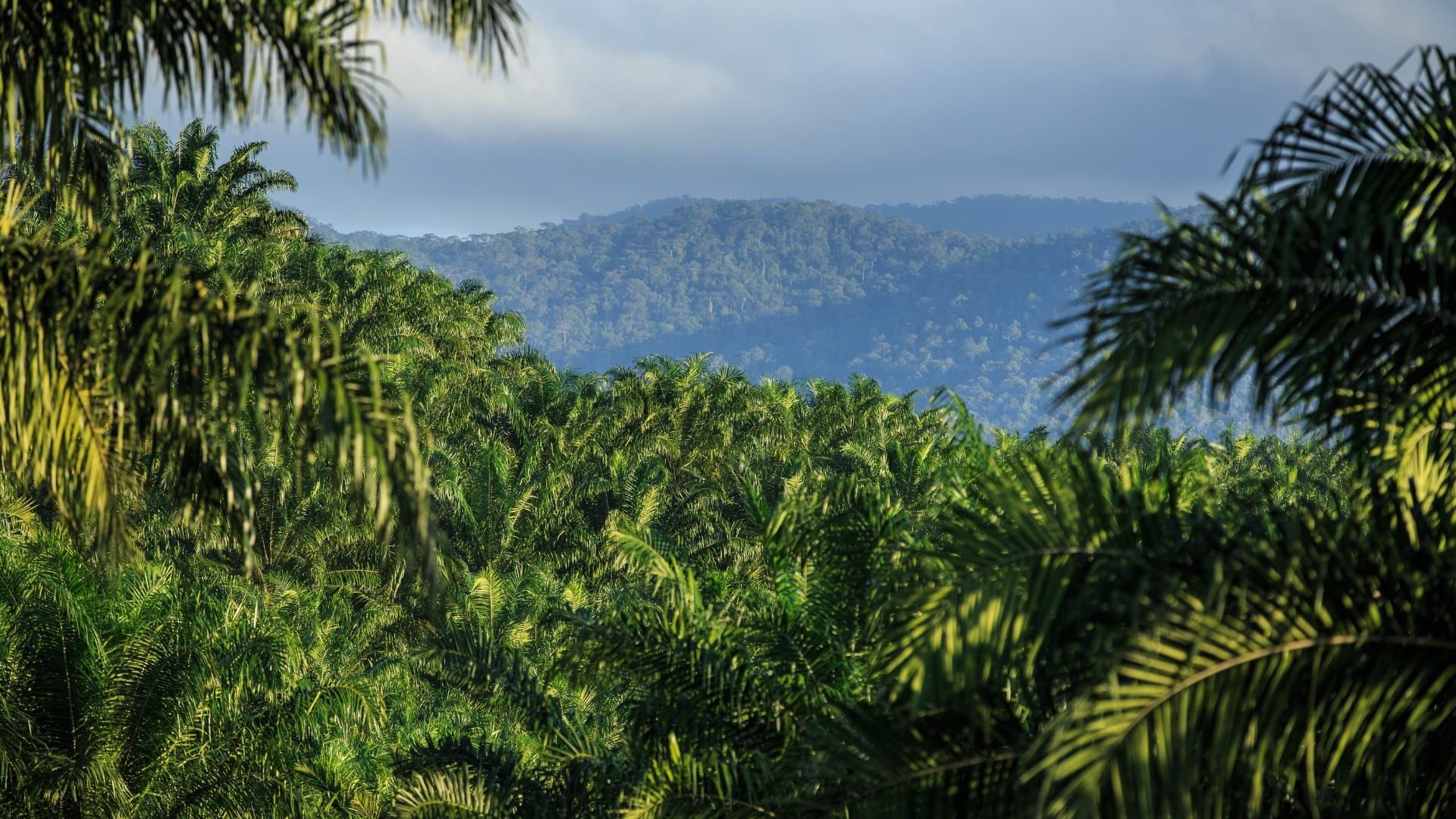
RSPO x JaSPON Conference and Member Engagement Forum 2025 Spotlights Japan’s Sustainability Success and Market Growth
Call for Expression of Interest: Independent Investigation of a Complaint
Call for Expression of Interest: Mexico National Interpretation Task Force for 2024 RSPO Principles and Criteria (RSPO P&C) and Independent Smallholder (ISH) Standard
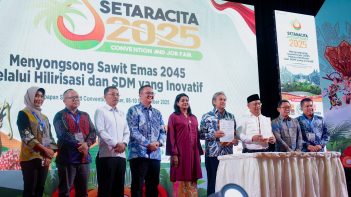
RSPO–APKASINDO Partnership to Boost Inclusive Growth, Certification, and Market Access for Oil Palm Smallholders

Open Letter to COP30 President: Integrating Forests and Biodiversity: A Policy Central to Paris Agreement Success

Bridging the Auditing Divide: Key Takeaways from the RSPO Assurance Forum 11
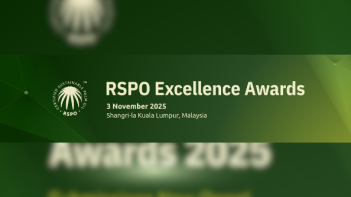
Extension of RSPO Excellence Awards 2025 Submission Deadline!
